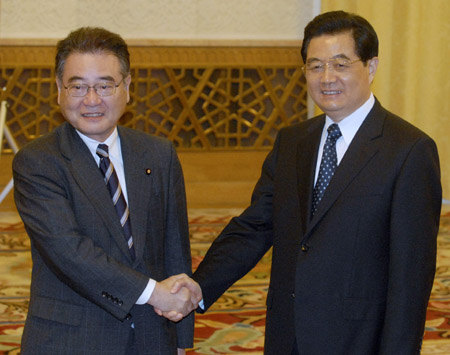A joint survey indicates both Chinese and Japanese people think the Sino-Japan relationship has improved significantly in the past year due to fruitful meetings of the two countries' top leaders.
 |
|
Koichi Kato (L), former secretary-general of the Japanese Liberal Democratic Party (LDP) and chairman of the Japan-China Friendship Association, shakes hands with Chinese President Hu Jintao during a meeting at the Great Hall of the People in Beijing September 7, 2008. [Agencies] |
The China-Japan Joint Opinion Poll sponsored by China Daily and Genron NPO of Japan was issued in Tokyo on Monday as the fourth poll following previous surveys.?
In the survey, 1,557 urban residents, 1,037 college students in China and 1,000 residents, 400 academics in Japan were surveyed simultaneously from late June to mid-July this year.
Regarding the importance of the Sino-Japanese relationship, an overwhelming 92.6 percent of students and 86.6 percent of residents from China, and 97.5 percent Japanese intellects and 80.3 percent Japanese residents consider the Sino-Japan relationship "important" and "relatively important".
When asked what they thought of the current Sino-Japanese relationship, 42.5 percent of Chinese students and 56 percent of Chinese residents said it was "good" or "relatively good", up 34.3 percent and 31 percent respectively from last year, while in Japan they were up 6.5 percent and 28.8 percent respectively.
Some 75.3 percent of Chinese residents and 76.3percent of students felt the Sino-Japan relationship improved in the past year, and 25.2 percent of Japanese residents had the same answer, up 6.1 percent from last year.
Topics such as Japanese rescuers and donations after the May 12 earthquake were added into the survey this time. The Chinese public generally took these Japanese actions as good ways to strengthen bilateral trust and sentiment, and a good beginning to deal with historical issues.
People from the two nations attached importance to their top leaders' meetings. Over 80 percent of Chinese residents and 58 percent of students considered Sino-Japanese leaders' meetings fruitful, while those in Japan responded 21.5 percent and 66.3 percent correspondingly.
According to the survey, Chinese responders are more optimistic than Japanese participants about the future of Sino-Japanese relations. About 82.3 percent of Chinese residents and 64.9 percent students are "optimistic" or "relatively optimistic" about China-Japan ties.
However, only 32.2 percent of Japanese residents and 50.8 percent of Japanese academics are optimistic about the future of Sino-Japanese relations, a decrease of 8.7 percent and 16.9 percent respectively from last year.
Cultural and economic signs top the impressions of the two countries in each other's eyes. When asked to think of Japan, the Nanjing Massacre, Japanese electrical appliances, cherry blossoms, Japanese food and Mount Fuji rank the top five in Chinese perceptions. For the Japanese, their top five ideas about China were an overheating economy, the Great Wall, the Beijing Olympics, and Chinese food.
Among students, historical issues (74%), territorial disputes (71.1%) and economic issues (26.5%) are the three main obstacles hindering Sino-Japanese ties.
Generally 69 percent of Chinese students and 63.2 percent of Japanese support using close cooperation and ties to deal with these challenges.
The Sino-Japan Joint Opinion Poll has been conducted since 2005 as part of the fourth "Beijing-Tokyo Forum" which will start from September 15 to 17 in Tokyo.
Dozens of high-level officials from China and Japan will attend the forum this year.
The event aims to create a bridge of communication and understanding between the two countries and a constructive impact on mainstream media.
(China Daily September 9, 2008)